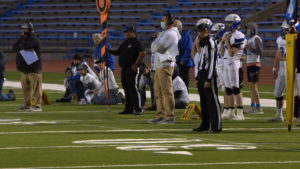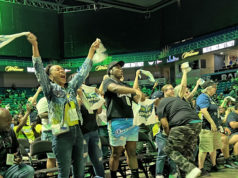This year’s Texas high school football state championship games wrap up this weekend. When I say “this year’s,” of course, I really mean “last year’s.” Normally the fall seasons conclude just as winter arrives. In 2020, not so much.
Thus we saw COVID-related delays that caused the season to finally reach its conclusion in mid-January with the 5A and 6A games at AT&T Stadium in Arlington. Though I live very close to that facility, the one title game I saw in person happened a few hours southwest of it. And the reason I attended made the game more remarkable in a way that would have mattered greatly even in a normal year.
This year’s Texas 1A Division II football state title game, originally planned for December 16 in Arlington, moved instead to a January 5 date in San Angelo. The six-man-a-side game promised to make history in at least one way. Either Balmorhea would win its school’s first state title or Richland Springs would win a state record 10th. But I had been brought in to follow the third team on the field.
The Texas Association of Sports Officials and its executive director, Michael Fitch, want to document their history, which, on this evening, focused on the head linesman. I use the phrase “linesman” because that’s what she calls herself.
That night in San Angelo Stadium, Crystal Cooksey became the first female official to work a state title game. The Garland resident officiates high school games through the Dallas Football Officials Association. The two schools selected that association to supply the officiating crew for the game and the organization selected Cooksey based on her performance over more than a decade of calling football games.
 I followed her and her colleagues in stripes throughout the evening, before, during, and after the game. Even with COVID protocols in place, the game had the same special buzz to it that state championship games should have. As Fitch pointed out, “It means just as much to the officials does the players and the coaches.” He always congratulates the crew on making it there in the officials room before the game and then gets out of the way and lets them get to work.
I followed her and her colleagues in stripes throughout the evening, before, during, and after the game. Even with COVID protocols in place, the game had the same special buzz to it that state championship games should have. As Fitch pointed out, “It means just as much to the officials does the players and the coaches.” He always congratulates the crew on making it there in the officials room before the game and then gets out of the way and lets them get to work.
And what was perhaps the most remarkable thing to me about the whole situation is this: there was nothing especially remarkable. And that’s a good thing.
The game was entertaining but not unusual.
“Two good teams,” noted Cooksey. “It was real close at first going back and forth. Nothing crazy really sticks out to me.”
Balmorhea pulled away in the second half to win their first title. The officials, including Cooksey did their jobs and trotted peacefully off the field afterwards. The Fox Sports Southwest broadcast talked about Cooksey’s achievement, but as far as most of the fans in the stands knew, the official who made sure the receiver had possession of the ball all the way to the ground before signaling a touchdown was just doing his (or in this case, her) job like any other head linesman would.
Her crew saw nothing peculiar about her being there and neither did anyone else. Fitch said, “I was standing there on the sideline. And I could see no difference. The coaches treated her no different. The players treated her no different.”
That matches what Cooksey herself told me about her career officiating this male-dominated sport. She never ran into discrimination as she progressed through her career. Of dealing with coaches, she said her experience has mirrored that of every other member of her profession: “As long as you show them, you know the rules and communicate with them, it’s fine.”
She grew up, like many kids of all genders in Texas, loving the sport of American football. She’s worked hard to master her craft, just like many other linesmen, line judges, back judges, referees, and umpires. She got rewarded for that passion and effort.
We know it’s not always that simple. Women have started to show up on football sidelines in recent years in multiple capacities and we can be sure many of their journeys have had more drama than Cooksey’s. But I’d love to think her story can provide a model for the way officiating, or any other employment situation for that matter, is supposed to work. It’s the idea that even if you don’t fit the stereotypical or historic model for a profession, your expertise and hard work can get you to the top. Sports has often provided a model for that sort of outlook, on the field, the court, and now on the sideline next to the down marker.
Disclosure: TASO hired me to produce a video about the game











